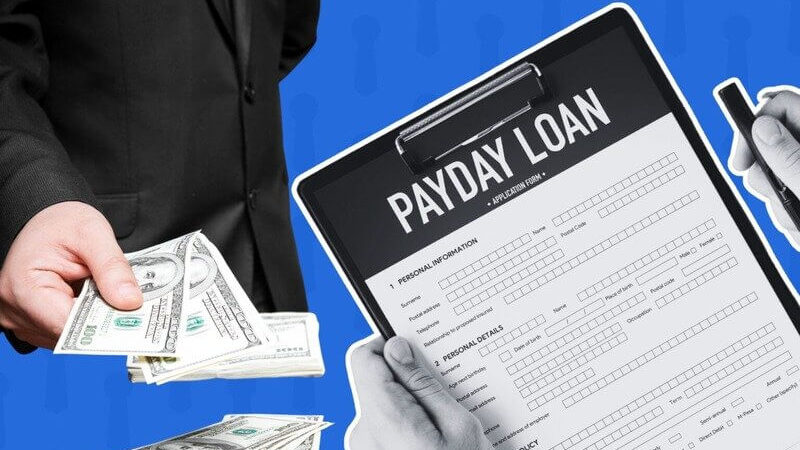What are Payday Loan Scams, and How Can You Avoid Them?

When a California consumer received a call that she was eligible for a $5,000 payday loan, she was intrigued. All she had to do was pay a $535 fee to get the money.
The call was supposedly from a recognized financial institution, so the consumer assumed it was legit. She paid the requested fee, only to get another call.
Her credit didn’t qualify her. For an additional $535, though, she’d have the loan in hand.
Unfortunately, the whole thing was a scam. The lender’s name mimicked the name of other well-known lenders, so it was an easy mistake to make. In the end, the fraudster stole $1,070.
The woman had fallen prey to a payday loan scam.
What Are Payday Loan Scams?
A payday loan is a fast turnaround, short-term loan that typically comes with a higher interest rate than other types of personal loans. Your next paycheck serves as collateral.
Here’s how it works:
You reach out to a payday loan service, either online or in person, and complete an application. You’re given a deadline to pay the funds back, with interest, and that deadline is usually within a couple of weeks.
Payday loans are popular because they’re available to those with less-than-stellar credit, but the higher interest rate makes it costly.
In recent years, scammers have found ways to take advantage of those who are down on their luck. They pose as payday lenders and reach out to borrowers.
These types of scams come in several different forms – let’s dive deeper.
Types of Payday Loan Scams

- Advance-Fee Loan Scams
- Fake Debt Collectors
- Phishing Scams
- Compromised Accounts
- Refund Scams
- Fraudulent Loans
1. Advance-Fee Loan Scams
What Is It?: You might get a message like “Congratulations! You qualify for a payday loan.” Next, you must pay an upfront fee to get your money. Scammers may request funds via cash, wire transfer, personal check, debit or credit card, bitcoin, or gift card. In some cases, the fake lender even sends you a check that later turns out to be counterfeit.
How to Spot It: A legitimate payday lender will not ask for a deposit to loan you money. You should only need to provide identification and proof of income to qualify. Legitimate payday lenders also don’t reach out to borrowers offering to loan money.
How to Avoid It: If you’re in the market for a payday loan, carefully research local lenders and only go with those with an online presence. Never pay a fee to kick off the payday loan process.
2. Fake Debt Collectors
What Is It?: Someone reaches out, claiming to be a debt collector. You “owe” money on a payday loan, the collector says. The caller either demands money or financial information to settle the debt.
How to Spot It: Like other types of loans, unpaid payday loans can be sent to collections. If someone contacts you about it, that person should know your name, contact information, and the amount of your debt.
How to Avoid It: If someone contacts you about any debt, request a debt collection letter. You have 30 days after initial contact to request a letter. Never pay money or provide financial information until the debt has been verified in writing.
✎ Read Full: What Are Debt Collector Scams? ➔
3. Phishing Scams
What Is It?: You’re directed to complete a form to get a payday loan. Maybe you contacted an online lender, or the lender contacted you. When you pull up the form, it’s requesting information someone can use to steal your identity, such as your Social Security number or bank account number.
How to Spot It: A payday loan company will never reach out to offer you guaranteed money. You should be directed to their standard application form if you’ve researched a lender and verified it’s legitimate.
How to Avoid It: Always research any payday lender before providing any information.
✎ Read Full: What is Phishing? How it Works and How to Prevent it? ➔
4. Compromised Accounts
What Is It?: Once you’ve applied for a payday loan, your information may reside on that lender’s server. Your information could be stolen if a hacker finds a way into that server. With your name, contact information, and Social Security number, identity theft is a real risk.
How to Spot It: Often, you don’t realize your data is being used for fraud until you spot unusual activity on your bank accounts. You may also find your credit score drops dramatically as someone uses your information to apply for loans.
How to Avoid It: Company data breaches are on the rise, and there isn’t anything that you, as the consumer, can do to stop them. You can, however, reduce your risks by limiting your loan applications and carefully vetting lenders, but the best course of action is to catch identity theft early. Identity theft protection services like Aura, LifeLock, and Identity Guard can reduce the impact of this type of fraud.
5. Refund Scams
What Is It?: With this scam, someone offers a payday loan but first needs to send a test payment to your account. The fraudster sends “proof” that the funds were deposited and asks you to refund the money. Ultimately, you learn the test payment never came, and the funds you sent were your own.
How to Spot It: Any time a stranger asks you to send money, it’s likely a scam. Payday loans come with no upfront fees or deposits. All charges are added to the loan and paid when it’s time to repay.
How to Avoid It: Be suspicious of anyone asking you to send money. Even if you see the funds in your account, that money could have been deposited using a bad check or stolen funds.
6. Fraudulent Loans
What Is It?: With this type of scam, you never applied for a payday loan in the first place. Someone used your information to take out a cash advance loan.
How to Spot It: Out of the blue, you’re contacted about a loan you never received. It could be the lender, or maybe it’s a debt collector. The party will have details of the borrowed amount and the contract you signed to repay it.
How to Avoid It: It can be tough to avoid identity theft since someone can get your information through various sources. To reduce your risk, be stingy with your Social Security number, only providing it when absolutely necessary. Consider identity theft protection services such as Aura to reduce losses if such a scam threatens your bank account.
Avoiding Payday Loan Scams
Payday loan scams have become common in recent years, but there are some things you can do to reduce your risk.
1. Find the Right Lender
If you’re in the market for a payday loan, take the time to track down the best lender for the job. Here are a few steps to take:
What if you were minding your own business when someone contacted you, offering a loan?
First, be skeptical. If at all possible, hang up the phone and find lenders on your own. That’s the surest way to avoid being scammed.
If someone has offered you a deal you can’t refuse, follow the list above to research the lender, and never pay a deposit in exchange for a short-term loan.
2. Research Debt Collectors
If you’re dealing with communications from a debt collector, there are ways you can research those.
One step is to check the Federal Trade Commission’s List of Banned Debt Collectors.
Be aware that scammers may provide false information about their legitimacy to get you to send money, so don’t provide information that could be used for identity theft, including your name, address, or phone number.
Ignore any threatening language. A scammer may tell you you’ll be arrested if you don’t take action immediately. You won’t be tossed in jail for not paying a bill.
The best thing you can do if you receive such a call is to request a written confirmation of the debt via a debt collection letter. If you receive such a letter, research as best you can to track down the source of the debt.
Maybe you had a payday loan you forgot, but it’s possible someone might have assigned the debt to you by mistake.
3. Refuse Unsolicited Requests
Scammers operate by contacting many people via phone, email, text, or direct message. If they hit enough accounts, someone will bite.
Don’t be that person.
Refuse all requests, whether it is a link in a message or a phone call.
You could be like me and set your phone to silence unknown callers.
If I’m at the register at Old Navy or buying something online, and the cashier or app asks for an email address, I give them an old one I never use. If there’s even the slightest risk someone’s going to sell my email address off to one of those mailing list services, I’m giving my junk email account.
When you get a message or phone call, go with your gut. If you even suspect it might be a scam, tread carefully.
4. Avoid Sending Money to Strangers
Payday loan services don’t charge upfront fees. There may be fees, and there will definitely be interest, but they’ll be added to the loan amount.
Some payday loan services will ask you to write and postdate a check. This serves as collateral and is standard practice. They may also ask you to provide a bank account number to directly deposit the loan funds, but they will not ask you to send money to them.
As with other loans, you’ll be billed the amount you owe. This will be a repayment of your loan, plus interest and fees.
If a lender asks you to return funds deposited to your account, beware. This is especially true if you haven’t carefully vetted the lender.
5. Monitor Your Financials
Keeping an eye on your accounts can help you catch fraud immediately. If someone has hacked into a payday lender’s account and grabbed your information, you’ll want to know if they’re accessing your account information.
The same goes for your credit. Someone could use your information to secure a payday loan, leaving you with the balance.
To keep an eye on things, take advantage of the one free credit report you get each year from AnnualCreditReport.com. If you’re turned down for credit, you can request a free credit report from the agency that declined your request.
6. Consider Payday Loan Alternatives
Payday loans can be a short-term solution if you’re in a pinch, but interest rates can be terrible. There are some other things to consider if your credit score isn’t high enough to qualify for a credit card, line of credit, or personal loan:
What to Do if You’ve Been Scammed?

If you have reason to believe your finances or identity may have been compromised, there are some steps you can take.
1. Contact Your Bank
Do you think scammers might have your financial information? If so, reach out to your bank ASAP. They can look at your account and advise you on the next steps.
You might need to change your account number. You may also need to order new cards if you used a debit or credit card. However, these are mostly painless processes.
2. Freeze Your Credit
Each of the three credit bureaus has a process to freeze your credit. Once frozen, lenders won’t be able to access your report to approve a credit request.
To freeze your credit, go to the website for each credit bureau and follow the process provided. You’ll need to go through the same steps to unfreeze your credit the next time you apply for a loan or credit card.
3. Report the Incident
Even if the scam wasn’t successful, it’s important to report it to the proper authorities. They may be able to take action to ensure it doesn’t happen to someone else.
Start with the Federal Trade Commission (FTC). The FTC investigates payday loan scams and has halted more than a few in progress. Your complaint will go into a database used by law enforcement both in the U.S. and abroad.
To file a complaint with the FTC, call 1-877-FTC-HELP (1-877-382-4357). You can also file a report with the Consumer Financial Protection Bureau.
4. Invest in Identity Theft Protection
Whether you think you’ve been scammed or not, identity theft protection can be a huge relief.
Think of it as insurance against these sorts of scams. You might never have to use it, but you’ll get peace of mind.
Identity theft protection services such as Aura, Identity Guard, and LifeLock monitor for fraudulent use of your information and help with recovery costs after your identity is stolen. Many services also monitor your accounts and alert you of any suspicious activity.
Conclusion
Payday loans can be pricey, but they also can bring some much-needed cash. Many payday loan scams are circulating, so it’s important to use caution when considering this type of loan.
As a general practice, if you avoid clicking on strange links or giving out information to strangers who contact you by phone, use an identity theft protection service like Aura, and keep up to date with the latest scams, you can keep yourself safe from some of the most common types of scams.
Related Articles About Financial Scams Scams:



